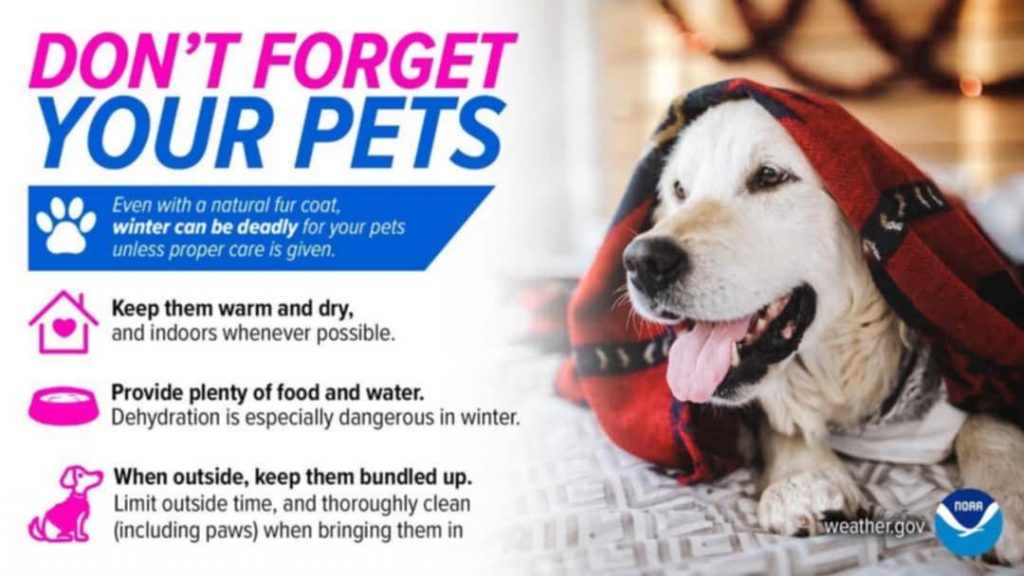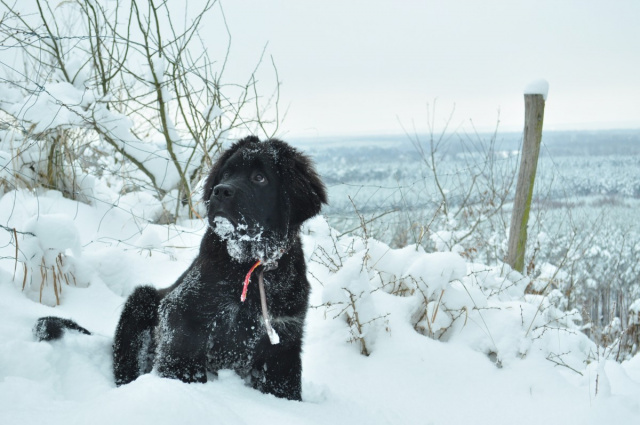
While most people are aware of the dangers warm weather poses to pets, cold weather can also present serious risks to both pets and livestock. Here’s how to keep your furry friends safe during the colder months.
Winter Wellness:
Has your pet had their annual wellness exam yet? Cold weather can exacerbate medical conditions such as arthritis, so it’s a good time to ensure your pet is healthy and ready for the winter months. Regular check-ups are important for all pets to stay in top condition.
Know Your Pet’s Limits:
Just like humans, pets have varying cold tolerances depending on their breed, coat type, body fat, and health. Be mindful of your pet’s limits. For example, elderly or arthritic pets may struggle to walk on snow or ice, while short-haired pets feel the cold much faster. Pets with diabetes, heart disease, or hormonal imbalances may also be more susceptible to temperature extremes. Consult your vet if you’re unsure about your pet’s cold-weather tolerance.
Provide Comfort and Choices:
Pets like to choose where they sleep, so offer them safe options to adjust to their needs. Let them move to a warmer or cooler spot as necessary.
Keep Pets Inside:
Cats and dogs should stay indoors in cold weather. While some breeds like Huskies may handle the cold better, all pets are at risk for frostbite and hypothermia. No pet should be left outside for extended periods in freezing temperatures.
Check for Feline Hitchhikers:
Cats, especially feral ones, may seek warmth by hiding under car hoods. Before starting your vehicle, tap the hood or honk the horn to check for any hidden animals.
Protect Their Paws:
Cold weather can damage your dog’s paw pads, causing cracking or bleeding. During walks, check their paws regularly and look out for ice build-up between their toes. Trimming the hair between their paws can help prevent iceballs from forming.
Dress for the Weather:
If your dog is sensitive to the cold, consider a sweater or coat. Wet clothing can make your dog colder, so make sure you have dry options available. Booties can also protect their feet, but make sure they fit properly.
Wipe Down After Walks:
De-icing chemicals and antifreeze are toxic to pets. After walks, wipe your dog’s feet, legs, and belly to remove any harmful substances.
Update Identification:
Winter weather can make it harder for pets to find their way home if they get lost. Ensure your pet has an up-to-date collar with ID tags and consider microchipping them for added security.
Don’t Leave Pets in Cold Cars:
Just like hot weather, cold cars pose a danger to pets. A parked car can quickly cool down and become a frigid environment for your pet. Limit car travel to essential trips, and never leave your pet unattended in the vehicle.
Prevent Poisoning:
Antifreeze and de-icing products are deadly to pets. Clean up any spills immediately, and keep chemicals out of reach.
Pet-Proof Your Home:
Since pets may spend more time indoors during winter, make sure your home is safe. Use space heaters cautiously, as they can cause burns or start fires. Check your furnace, install carbon monoxide detectors, and ensure your pet’s cage is away from drafts if you have birds.
Avoid Frozen Water:
When walking your dog, stay away from frozen lakes and ponds. Ice may not be thick enough to support your pet’s weight, and if they fall through, it could be deadly for both of you.
Provide Outdoor Shelter:
If your pet must stay outside, ensure they have a warm, dry shelter. Provide thick bedding and fresh, unfrozen water. The shelter should be insulated, raised off the ground, and protected from the wind. Avoid heat sources like space heaters or heat lamps, as they can be dangerous.

Recognize the Signs of Cold Stress:
If your pet is shivering, whining, or looking for warm places to burrow, they may be showing signs of hypothermia. Frostbite is harder to detect but may become apparent days later. If you suspect either condition, seek veterinary care immediately.
Be Prepared for Emergencies:
Winter weather can bring severe conditions, such as blizzards or power outages. Keep an emergency kit for your pet with food, water, medications, and other necessities for at least five days.
Feed Your Pet Well:
Outdoor pets may need more calories in winter to generate body heat. Talk to your veterinarian about adjusting your pet’s diet for the colder months. While some owners may think extra weight helps keep pets warm, it’s important to maintain a healthy weight to avoid other health risks.
Courtesy: American Veterinary Medical Association
Note: If you see an animal in distress or living in inadequate conditions, especially during extreme weather, contact your local animal shelter, humane society, or law enforcement. Don’t hesitate to speak up—your concern could save a life!










